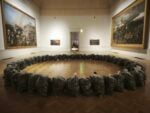Viktoria Binschtok

L’artista ci pone di fronte a un mix selvaggio di excerpta decontestualizzati, che compongono una realtà figurativa immanente e lasciano il resto al nostro apporto cognitivo.
Comunicato stampa
DE
Was transportieren Bilder, denen jegliche Hinweise zu Quelle, Ort und Motivation des Festgehaltenen fehlen? Eine solche Situation schafft Viktoria Binschtok. Sie konfrontiert uns mit einem wilden Mix entkontextualisierter Versatzstücke, die eine ganz eigene bildimmanente Realität konstruieren und überlässt den Rest unserer kognitiven Leistung. Mal laut, mal leise demonstrieren diese visuellen Cluster ihre unheimliche Verwandtschaft, der die rechnerische Leistung einer Maschine und die Unberechenbarkeit einer künstlerischen Geste zu Grunde liegt.
Die präzise re-inszenierten Fotografien, die stets auf existierende Bilder verweisen, entziehen sich durch ihren artifiziellen Schein einer simplen Einordnung in gängige Genres – Anschnitte, Überlappungen mehrerer Bildebenen und über Bildgrenzen hinausführende Elemente greifen unsere screen-basierte Sehgewohnheit auf und überführen diese in den Offline-Raum. Still-Life oder Snap-Shot, Profi- oder Amateurbild, privat oder öffentlich: alle Filter sind auf Null gesetzt.
Vernetzte visuelle Informationen lenken uns für den Moment von unserem linearen Denken ab, zugunsten einer lustvollen Auseinandersetzung mit einem Medium, das längst nicht nur politisch instrumentalisiert wird, sondern zur Messlatte jedes Einzelnen in einer Bewertungskultur geworden ist. Sie ist die stetig steigende Währung im Handel um Aufmerksamkeit, doch ihr Subtext ist der alte: Es könnte alles so, oder ganz anders gewesen sein.
Viktoria Binschtok lebt und arbeitet in Berlin. Ihre Arbeiten wurden in zahlreichen Einzel- und Gruppenausstellungen gezeigt, in den letzten Jahre unter anderem: Pinakothek der Moderne, Munich; C/O Berlin; KW Institute for Contemporary Art, Berlin; Fondazione Prada, Milan, Italy; Centre de la Photographie Genève, Switzerland; pier24, San Francisco, USA; Museum Folkwang, Essen; Centre Pompidou, Metz, France; Schirn Kunsthalle, Frankfurt am Main; Heidelberger Kunstverein, Heidelberg; Georgian National Museum, Tbilisi, Georgia, The Krasnoyarsk Museum Center, Siberia; Kunstverein Göttingen; Museum der Bildenden Künste Leipzig.
IT
Cosa trasportano immagini alle quali manchi qualsiasi rimando a fonte, luogo e motivazione dello scatto? È questo il tipo di situazione creato da Viktoria Binschtok. L’artista ci pone di fronte a un mix selvaggio di excerpta decontestualizzati, che compongono una realtà figurativa immanente e lasciano il resto al nostro apporto cognitivo. Ora con forza, ora sottovoce questi cluster visuali mostrano la loro inquietante affinità, alla base della quale vi sono il calcolo di una macchina e l’incalcolabilità del gesto artistico.
Le fotografie, accuratamente riallestite e che sempre rinviano a immagini esistenti, in virtù della loro parvenza artificiale si sottraggono a una semplice collocazione nei generi correnti: tagli e sovrapposizioni tra più livelli dell’immagine ed elementi che conducono oltre i suoi confini catturano le nostre abitudini di osservazione forgiate dagli schermi e le trasportano nello spazio off line. Nature morte o snap shot, immagini professionali o amatoriali, private o pubbliche: tutti i filtri sono ridotti a zero.
Reti di informazioni visive ci distolgono temporaneamente dal nostro pensiero lineare, attirandoci in un confronto eccitante con un medium che non solo viene da tempo strumentalizzato in senso politico, ma che è diventato il metro di ognuno di noi in una cultura della valutazione permanente. È la valuta in continua crescita nel commercio dell’attenzione, ma il suo sottotesto è quello di sempre: tutto potrebbe essere stato così, o in modo del tutto diverso.
Viktoria Binschtok vive e lavora a Berlino. Il suo lavoro è stato esposto in numerose mostre personali e collettive, in questi ultimi anni, tra le altre: Pinakothek der Moderne, Munich; C/O Berlin; KW Institute for Contemporary Art, Berlin; Fondazione Prada, Milan, Italy; Centre de la Photographie Genève, Switzerland; pier24, San Francisco, USA; Museum Folkwang, Essen; Centre Pompidou, Metz, France; Schirn Kunsthalle, Frankfurt am Main; Heidelberger Kunstverein, Heidelberg; Georgian National Museum, Tbilisi, Georgia, The Krasnoyarsk Museum Center, Siberia; Kunstverein Göttingen; Museum der Bildenden Künste Leipzig.
EN
What do images communicate without any indication of the source, location, or the motivation behind what has been captured in them? Viktoria Binschtok achieves just such a situation, confronting us with a wild mix of decontextualized components that construct a reality all its own immanent to the image and leaving the rest to our cognitive abilities. Sometimes loudly, sometimes quietly, these visual clusters demonstrate their uncanny affinity based on the calculations of a machine and the incalculability of an artistic gesture.
The precisely re-staged photographs, which always refer to already existing images, refuse to be easily classified in standard genres by their artificial appearance—cuts, overlappings of several visual layers, and elements that go beyond visual borders take up our screen-based habits of vision and move them to an offline space. Still life or snapshot, professional or amateur photograph, private or public: all filters are turned off.
Networked visual information distracts us for a moment from our linear thinking in favor of a pleasurable engagement with a medium that for a long time now has not only been instrumentalized politically, but has become a yardstick for all of us in our culture of instant evaluation. It is the currency in the attention business, always rising in value, yet its subtext is an old one: It could all be this way, but it could also be entirely different.
Viktoria Binschtok lives and works in Berlin. Her works have been presented both in numerous solo and group exhibitions, in recent years a.o. at Pinakothek der Moderne, Munich; C/O Berlin; KW Institute for Contemporary Art, Berlin; Fondazione Prada, Milan, Italy; Centre de la Photographie Genève, Switzerland; pier24, San Francisco, USA; Museum Folkwang, Essen; Centre Pompidou, Metz, France; Schirn Kunsthalle, Frankfurt am Main; Heidelberger Kunstverein, Heidelberg; Georgian National Museum, Tbilisi, Georgia, The Krasnoyarsk Museum Center, Siberia; Kunstverein Göttingen; Museum der Bildenden Künste Leipzig.



